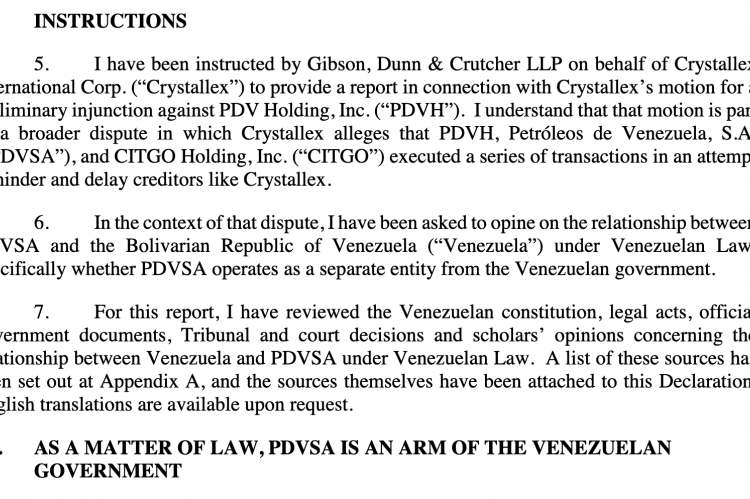Couple of rulings this week, one by the U.S. Supreme Court and another by a Delaware judge, have set the stage for the permanent loss of CITGO, the most important overseas asset Venezuela had left. The rulings side with Crystallex in its attempt to enforce a $1.4 billion judgement due to expropriation of its Venezuela assets by Hugo Chavez. Crystallex's position could be compared to first-past-the-post: of all Venezuela creditors, and there are lots, it is the first in obtaining such rulings. To understand Crystallex's position against CITGO, nothing better than reading Jose Ignacio Hernandez's expert opinion on the matter. You see, once upon a time, Hernandez was batting for Crystallex. Imagine how absurd, aside from conflicted, could arguments from this man now look to Delaware's Hon. Leonard P. Stark, when seeing him argue for the other side.
This site's beef with Hernandez is public: once he was found to have been retained by Helsinge, Glencore, Trafigura, et al in a fraud case involving PDVSA, his position became untenable in our view. Juan Guaido, the puppet pretending to be Venezuela's "interim president", appointed Hernandez as his legal counsel, tasked to represent that "interim presidency" in ongoing cases in different jurisdictions. Having argued for Crystallex, Hernandez is now trying to block rulings that favour Crystallex. Before the same Delaware judge. While refusing to come clean on the subject, Hernandez is almost certainly behind Guaido's strategy in Switzerland in criminal proceedings PDVSA brought against Helsinge, Glencore, Trafigura, etc. Hernandez is also trying to "renegotiate" Venezuela's ~$180 billion debt with different creditors.
The Crystallex v CITGO case illustrates the kind of mess Venezuela's in. A plaintiff's legal expert emerges as sovereign's defendant, assets collateralised many times over meant to settle multi billion dollar disputes, two Venezuelan "presidents" legal teams quarrelling over control and ownership of sovereign assets in foreign courts...
Favourable rulings may look good on paper. In practice, value of portfolio of sovereign assets is way, way lower than what's owed. Quite simply, there's not enough value to go round. More importantly, there isn't a single indication that with chavismo in power Venezuela will ever recover financially, or that Guaido is anywhere near replacing Maduro.
CITGO was gone before this week's events. One half (49.9%) chavismo pawned to Rosneft for a $1.5 billion loan a while ago. The other 50.1% was put as collatoral for a PDVSA bond (2020). Guaido first ordered payment of bond interests, to then renege, through Hernandez, on legality of bond issue. Now two rulings give Crystallex the right to enforce on its $1.4 billion judgement. How far is the value of that asset going to be stretched?
There are other judgements against Venezuela / PDVSA. Some even larger (Conoco). Then, there are groups of creditors, seriously considering going to battle with Venezuela. This site has news for them: nobody, nowhere, is going to see anything remotely close to what's owed. The money is gone. There is no pile of gold left, anywhere.
As of this writing, PDVSA sits on some 14.7 million barrels of crude in its inventories. Venezuelan crude is traded below market. Recent recap contracts seen by this site show Brent -$15 per barrel. The canard that Venezuela has "the world's largest crude reserves", and therefore an infinite capacity to pump oil out of the ground, is beyond pointless, for no one is going to invest one dime in a petrostate run by narcos in the middle of an oil glut with ever decreasing prices.
Venezuela is a failed state. It is bankrupt and way beyond rescuing under present concurrent regimes. Just like CITGO. Treasury is meant to have the last say on whether Crystallex gets its due. If recent decisions are anything to go by (Nynas), it is likely Maduro won't fight OFAC to grant required license. We remain skeptical, however, that Crystallex will manage to get anything close to $1.4 billion.

